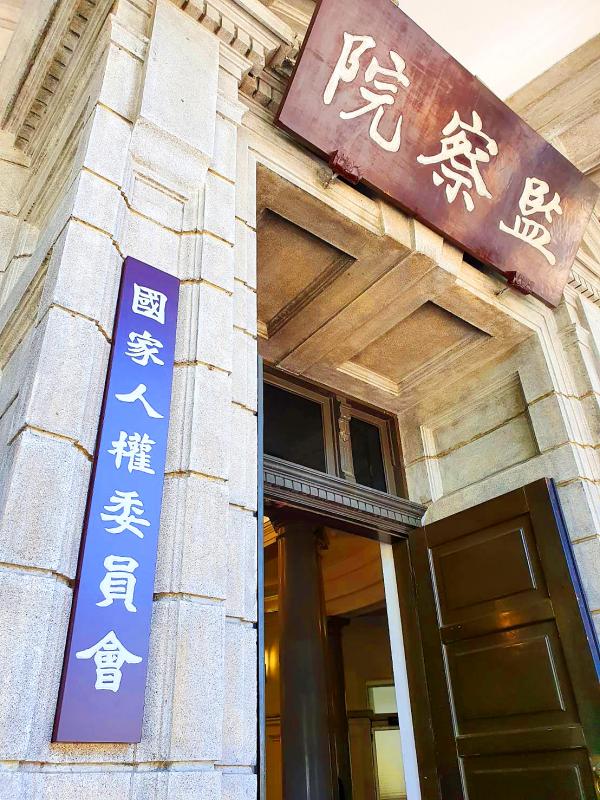A request has been issued to withdraw a proposal by the Control Yuan’s National Human Rights Commission regarding members’ powers on grounds that it goes against previous Legislative Yuan decisions and is unconstitutional, sources said on Friday.
The commission was established following passage of the Organic Act of the Control Yuan National Human Rights Commission (監察院國家人權委員會組織法) on Dec. 10 last year.
The Control Yuan in September tendered the bill for review by the legislature’s Judiciary and Organic Laws and Statutes Committee.

Photo: Hsieh Chun-lin, Taipei Times
The proposal was that the commission, following a Control Yuan resolution, would be able to apply to the Judicial Yuan for a constitutional interpretation should it find laws that are unconstitutional because they severely infringe on human rights.
At a committee meeting last month, Judicial Yuan Deputy Secretary-General Yeh Li-hsia (葉麗霞) said that the bill would grant the commission powers to ask for constitutional interpretations, an expansion of the Control Yuan’s powers that directly contravenes its role and might itself be unconstitutional.
The bill stipulated that the commission would be able to impeach or denounce individuals who refuse to comply with its investigations, and fine individuals, companies or groups up to NT$500,000 for each failure to comply.
Commission members late last month met with Democratic Progressive Party (DPP) caucus members to explain the bill.
DPP caucus whip Ker Chien-ming (柯建銘) told the meeting that he believes clauses of the bill risk breaching human rights and being unconstitutional, sources said.
Later on Friday, Ker told reporters that the request to withdraw the draft stemmed from a Legislative Yuan addendum during the passage of the organic act that to properly grant commission members such powers, the Control Yuan should amend the Control Act (監察法).
The addendum was adhered to by then-Control Yuan president Chang Po-ya (張博雅), but ignored by Chen Chu (陳菊), who assumed the post in June, which made the request to withdraw the bill necessary, Ker said.
The Constitution has delineated the powers of Control Yuan members — issuing corrective notices, and impeaching or recalling officials — which does not include the draft’s request for the ability to seek constitutional interpretations, he said.
An opinion piece in yesterday’s edition of the Chinese-language Liberty Times (the Taipei Times’ sister paper) said it was unsurprising that the proposal was rebuked.
The draft ignored the legislature’s clear addendum to regulate the commission’s powers via the Control Act, the author wrote.
The power to apply for constitutional interpretations would give commission members a direct channel to the Council of Grand Justices, an ability that could easily be abused, they wrote.

The Taipei Mass Rapid Transit (MRT) Wanda-Zhonghe Line is 81.7 percent complete, with public opening targeted for the end of 2027, New Taipei City Mayor Hou You-yi (侯友宜) said today. Surrounding roads are to be open to the public by the end of next year, Hou said during an inspection of construction progress. The 9.5km line, featuring nine underground stations and one depot, is expected to connect Chiang Kai-shek Memorial Hall Station to Chukuang Station in New Taipei City’s Jhonghe District (中和). All 18 tunnels for the line are complete, while the main structures of the stations and depot are mostly finished, he

Taipei is to implement widespread road closures around Taipei 101 on Friday to make way for large crowds during the Double Ten National Day celebration, the Taipei Department of Transportation said. A four-minute fireworks display is to be launched from the skyscraper, along with a performance by 500 drones flying in formation above the nearby Nanshan A21 site, starting at 10pm. Vehicle restrictions would occur in phases, they said. From 5pm to 9pm, inner lanes of Songshou Road between Taipei City Hall and Taipei 101 are to be closed, with only the outer lanes remaining open. Between 9pm and 9:40pm, the section is

The first global hotel Keys Selection by the Michelin Guide includes four hotels in Taiwan, Michelin announced yesterday. All four received the “Michelin One Key,” indicating guests are to experience a “very special stay” at any of the locations as the establishments are “a true gem with personality. Service always goes the extra mile, and the hotel provides much more than others in its price range.” Of the four hotels, three are located in Taipei and one in Taichung. In Taipei, the One Key accolades were awarded to the Capella Taipei, Kimpton Da An Taipei and Mandarin Oriental Taipei. Capella Taipei was described by

The Taipei Economic and Cultural Office in Vancouver, Canada, on Saturday hosted a reception to celebrate Double Ten National Day. Conservative Canadian lawmaker Marc Dalton called Taiwan a “beacon of courage and resilience in the face of rising authoritarianism,” according to a post on the Taiwan in Vancouver Facebook page. Also in attendance were fellow conservative caucus members Tako Van Popta and Chak Au, who said that Taiwan plays an “indispensable role” in ensuring global peace, prosperity and stability due to its strategic position in the Indo-Pacific region, it said. Canadian lawmaker Michael Cooper also recorded a message wishing Taiwan a